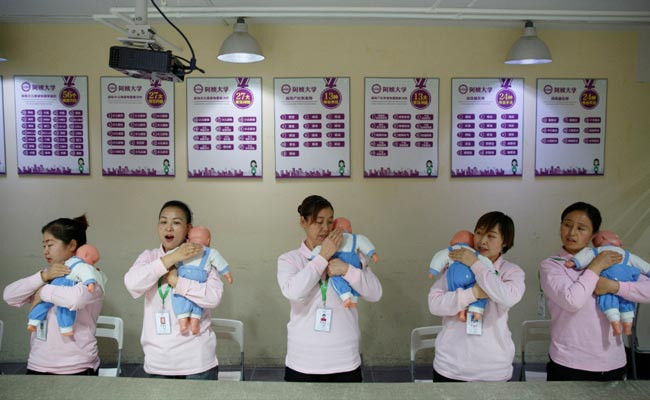China Raises Retirement Age to Address Aging Population and Shrinking Workforce
Starting next year, China will raise its retirement age for workers, which is now among the youngest in the world's major economies, in an effort to address its shrinking population and aging work force. The Standing Committee of the National People's Congress, the country's legislature, passed the new policy Friday after a sudden announcement earlier in the week that it was reviewing the measure, state broadcaster CCTV announced. The policy change will be carried out over 15 years, with the retirement age for men raised to 63 years, and for women to 55 or 58 years depending on their jobs. The current retirement age is 60 for men and 50 for women in blue-collar jobs and 55 for women doing white-collar work.
The move to raise retirement ages in China was motivated by the need to address the growing pressure on the nation's pension system, which is being strained by an aging population and a shrinking workforce. This pressure is measured by the dependency ratio, which counts the number of people over the age of 65 compared to the number of workers under 65. In 2022, China's dependency ratio was 21.8%, meaning that roughly five workers would support one retiree. This percentage is expected to rise, meaning fewer workers will be shouldering the burden of one retiree.
"We have more people coming into the retirement age, and so the pension fund is (facing) high pressure. That's why I think it's now time to act seriously," said Xiujian Peng, a senior research fellow at Victoria University in Australia who studies China's population and its ties to the economy. The previous retirement ages were set in the 1950's, when life expectancy was only around 40 years, Peng said. The policy will be implemented starting in January, according to the announcement from China's legislature. The change will take effect progressively based on people's birthdates.
Demographic Pressures and the Need for Change
The demographic pressures facing China are significant. By the end of 2023, China counted nearly 300 million people over the age of 60. By 2035, that figure is projected to be 400 million, larger than the population of the U.S. The Chinese Academy of Social Sciences had previously projected that the public pension fund will run out of money by that year. Pressure on social benefits such as pensions and social security is hardly a China-specific problem. The U.S. also faces the issue as analysis shows that currently, the Social Security fund won't be able to pay out full benefits to people by 2033.
"This is happening everywhere," said Yanzhong Huang, senior fellow for global health at the Council on Foreign Relations. "But in China with its large elderly population, the challenge is much larger." The country's birth rate has been falling for years, driven by a combination of factors including the one-child policy, rising living costs, and cultural shifts. In 2022, China's National Bureau of Statistics reported that for the first time the country had 850,000 fewer people at the end of the year than the previous year, a turning point from population growth to decline. In 2023, the population shrank further, by 2 million people.
The Impact of the Policy Change
The policy change is expected to have a significant impact on China's workforce and economy. For example, a man born in January 1971 could retire at the age of 61 years and 7 months in August 2032, according to a chart released along with the policy. A man born in May 1971 could retire at the age of 61 years and 8 months in January 2033. The necessary course correction will cause short-term pain, experts say, coming at a time of already high youth unemployment and a soft economy. However, the move is seen as a necessary step to ensure the long-term sustainability of the pension system and address the challenges of an aging population.
A 52-year-old Beijing resident, who gave his family name as Lu and will now retire at age 61 instead of 60, was positive about the change. "I view this as a good thing, because our society's getting older, and in developed countries, the retirement age is higher," he said. Li Bin, 35, who works in the event planning industry, said she was a bit sad. "It's three years less of play time. I had originally planned to travel around after retirement," she said. But she said it was better than expected because the retirement age was only raised three years for women in white-collar jobs.
Public Reactions and Concerns
Some of the comments on social media when the policy review was announced earlier in the week reflected anxiety. But of the 13,000 comments on the Xinhua news post announcing the news, only a few dozen were visible, suggesting that many others had been censored. Others said they had anticipated the announcement. "This was expected, there isn't much to discuss. Men in most European countries retire when they are 65 or 67, while women do at 60. This is going to be the trend in our country as well," one Weibo user said.
Long-Term Implications
The policy change is a significant step for China, reflecting the country's growing awareness of the challenges of an aging population. The move is likely to be followed by other policy changes aimed at supporting older workers and adapting to the demographic shift. The impact of the policy change will unfold over the coming years, but it is clear that China is facing a new era of demographic challenges.
Looking Ahead: A New Era of Demographic Challenges
The decision to raise China's retirement age represents a significant shift in the country's social and economic landscape. As China's population continues to age, the government will need to find ways to address the challenges of a shrinking workforce, a growing elderly population, and an increasingly strained pension system. This policy change is a first step in that direction, but it will require ongoing efforts to ensure the long-term sustainability of China's social safety net. It will be interesting to see how China navigates these challenges in the years to come.


















